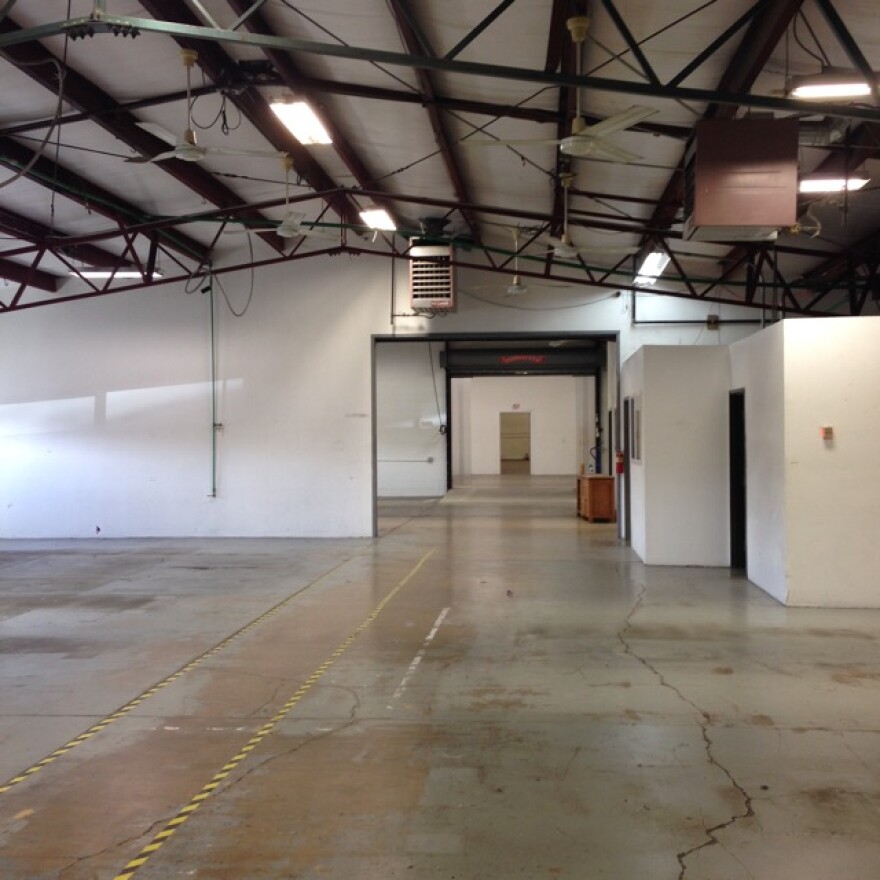An evolving new industry in Oregon is having—and causing-- growing pains. Until recently, many commercial and industrial spaces in Eugene and Springfield were vacant and property owners were bleeding money. Now, in large part because of the cannabis industry, warehouse space is hard to find.
A 16-thousand square foot industrial building in west Eugene has been under contract for sale to a marijuana grower for more than six months. There's a carpeted suite of offices up front.
[Door opening]
and behind that:
[Door closing]
Reporter / Erving “Big open space here and then another one back there. Oh wow, it keeps on going. It does keep going actually.”
John Erving is a commercial real estate broker with Evans, Elder and Brown.
Erving: “This building, because it has sort of these different spaces, different sized spaces was something that is of interest to folks in the business.”
Erving says the law requires uses like growing, processing and distribution take place in isolated areas. To get a permit to grow marijuana, you have to have an address. Erving says those who knew what they were doing started buying and leasing property last fall, ahead of the January 4th application date.
Erving: “I personally didn't see this coming the way that it did. We heard about it, but I'm not sure that we truly realized just how much interest there would be.”
Erving says the reviving economy was already driving warehouse prices up. Now they're at a level not seen since before the recession.

It's been especially difficult to match people to rental space because, Erving estimates, nine out of 10 property owners don't want to lease to the cannabis market. Many can't, because they have loans, and the business is still illegal in the eyes of federally insured banks.
Phill Schwartz is a partner at New Economy Consulting, a Portland-based firm that advises investors and entrepreneurs on the cannabis landscape. He believes winning over building owners was a bigger challenge two years ago:
Schwartz: “And now that is less the problem. It's more of a problem of finding the real estate itself than convincing the landlords to lease to you.”
Securing the right space, in the correctly zoned part of town is tricky. Guiding clients through the layers of state and local laws is a big part of what Schwartz does.
Schwartz: “The truth is that marijuana is an ever-evolving landscape of rules and regulations.”
Bethany Sherman found out first hand. She's CEO of OG Analytical, a firm that tests marijuana for potency and contaminants. The company recently learned that under the rules for labs in the recreational market, they can't operate in their current space:
Sherman: “So basically we're now stuck with this position where we have to relocate our lab in a very short period of time.”
They did stumble on a water testing facility that's moving, but Sherman and her nine employees will have to scramble to remodel and license the new location.

All this shuffling by the cannabis sector has affected others who use warehouses. Caleb Bruce is a woodworker who learned late last year his building was being sold to a marijuana grower.
Bruce: “Myself and four others were given 30 days eviction notice on December 28th. Nothing really happens until January 5th in the realty world. So, that worked out to about 25 days notice.”
Bruce found a place in Springfield, but it costs almost double his old rent and is not as well maintained. One of the other small businesses in his old building was not so lucky:
Bruce: “I watched a fellow cabinet maker not able to survive a move. He couldn't find a place that fit his needs for what he could pay so he had to sell all of his tools. Pretty much retire.”
The tightening real estate market has revitalized some neglected and mis-used properties. Phill Schwartz just completed a long process to get a company up and running in Springfield:
Schwartz: “This building was previously abandoned. I believe the previous tenants had set up a kind of a pop-up hotel.”
The buyers did substantial renovation and Schwartz says the improved space is beautiful. He says cities and landlords should welcome cannabis as an opportunity to restore distressed property.
The new businesses benefit the economy in other ways. Tax receipts for the first month in Oregon exceeded the projected income for this year. An early jobs report says dispensary shops alone have added more than 2,000 jobs in the state. With additional uses coming soon, realtor John Erving says:
Erving: “I would expect to have the phone ringing off the hook as we move into processing and distribution and those other licenses over the next year or two.”
The future enterprises will need space for their employees. Some industrial construction is underway in Eugene and Springfield. Erving says, for the first time in a decade, there's enough demand to justify the building costs.





